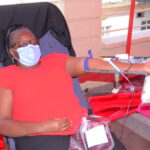Hilton Foundation has extended a refugee financing grant of $500,000, (Ugx 1,870,000,000) to Opportunity Bank Uganda and FINCA Uganda to address several challenges faced by refugees including, poverty, food insecurity, and a lack of access to health and education.
Uganda continues to host refugees at an unprecedented scale, keeping its borders open to about 1.5 million refugees, including more than 860,000 children.
Under the Early Childhood Development program, Opportunity Bank will focus on Nakivale and Kampala whereas FINCA will put emphasis on Kiryandongo and Kampala, both providing finance and financial literacy to these refugee settlements.
Speaking at the launch of the program, Mr. James Onyutta – Managing Director, FINCA noted that they have spent about three years working with refugees by providing financial education and that grant support will help them to target their interventions.
The banks, he said, will not only provide very affordable financial solutions but also put emphasis on centers training children below the age of eight (08) to empower them with the skills to be able to be productive in the future.
“We’ve reached over 10,000 people in financial education. We’ve seen millions of savings in those communities and we are now also providing credit into those areas with over shs 250 million in loans.”
“Now, the first part of the project is going to be child-centered development centers to really get to learn a bit more on up-skilling the center holders or being able to deliver the right learning skills of these children, but also we’re going to work with the communities to identify those with needs. Some of the needs in those areas are really financing….most of these parents cannot afford to send their children to learning centers,” he added.
The CEO – Opportunity Bank Uganda, Owen Amanya commended the Hilton Foundation for the grant and pledged to render the refugees with more finances and financial literacy.
“We thank the Hilton Foundation, the Office of the Prime Minister, which really gives us the push to venture into refugee space. We do appreciate the International Labor Organization that has also given us some support.”
He noted that the Early Childhood Development project will be an addition to what they’ve been doing in these communities.
“We’ve really achieved some great milestones with the refugee space in terms of financial literacy, loans given, the savings we’ve been able to pick from the refugee community and the host communities and also the business potential that lies there.”
Amanya noted that a number of the refugees are trying to do business but they don’t have access to markets but also can’t scale because they don’t have capital which calls for basic teaching to come together and organize them.
“It is so fulfilling when you help them complete their value chains,” he noted.
The Opportunity Bank Head of Business, Amos Bonna noted that they are the first commercial bank with a branch in a refugee settlement.
“For us, refugee lending is not a project. It is a lifestyle that we’re going to do and in the next three years, we have planned to open more branches in refugee settlements because we believe in that model, we believe in humanitarian financing.”
At Opportunity Bank, he said, they are focused on the sector of agriculture. But stretching to education with a focus on primary – private schools and the Early Childhood Development project will be much easier for them.
He also applauded Hilton Foundation, “because we believe we cannot serve over 1.5 million refugees as an institution [but] if we all partner together and hold our hands, then we bring social change.”
According to the United Nations Children’s Fund (UNICEF), 60 per cent of all refugees in Uganda are children. Behind these numbers, are the individual faces and stories of children, who, in many cases, have experienced terrible, life-altering events.
Uganda is home to over 900,000 child refugees and asylum seekers who have fled conflict or persecution from South Sudan, the Democratic Republic of the Congo and Burundi. Of these, over 71 per cent are from South Sudan where years of fighting and economic collapse have relentlessly forced families to abandon their homes.
Most refugee children live with the trauma of having witnessed or suffered forced displacement, separation from loved ones, and physical and sexual violence. Even in refuge, many continue to be vulnerable to marginalization and violence, especially gender-based violence.








